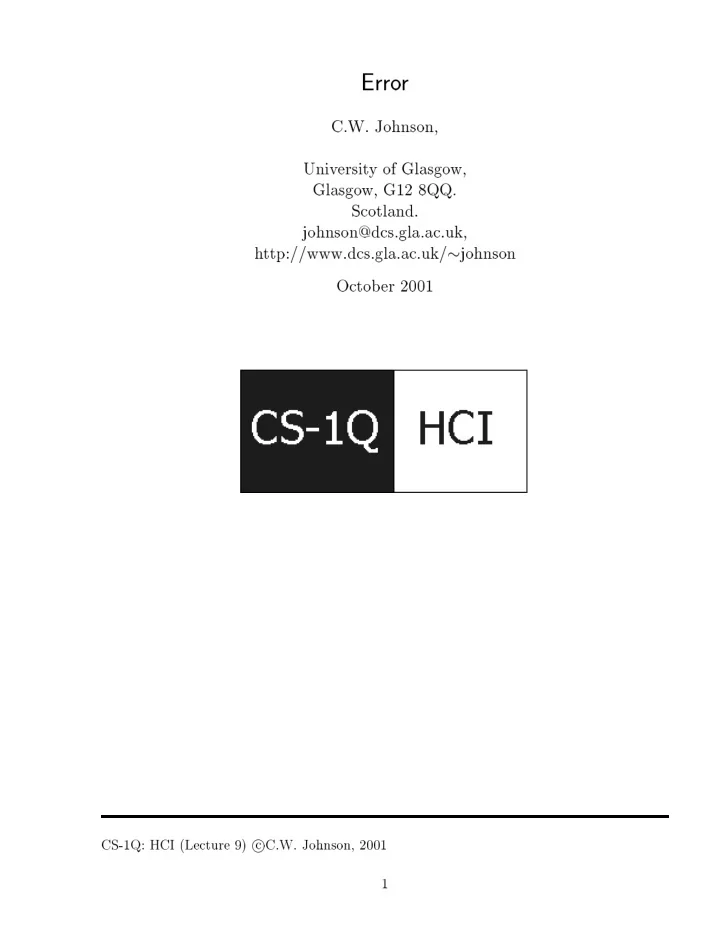

Erro r C.W. Johnson, Univ ersit y of Glasgo w, Glasgo w, G12 8QQ. Scotland. johnson@dcs.gla.ac.uk, h ttp://www.dcs.gla .a c.uk/ � johnso n Octob er 2001 c CS-1Q: HCI (Lecture 9) � C.W. Johnson, 2001 1
Erro rs Slips, lapses, mistak es and violations. � Erro r tolerant design � Erro r detection and recovery . � Organisational facto rs. � c CS-1Q: HCI (Lecture 9) � C.W. Johnson, 2001
Slips, Lapses and Mistak es Junio r trader sells $16m of German b ond futures. � Ac kno wledgemen t: BBC (No v. 1998) T rader thought it w as a training screen. � Whose fault is this? T rader o r Company? � c CS-1Q: HCI (Lecture 9) � C.W. Johnson, 2001
Slips, Lapses and Mistak es Erro r: � - unwitting deviation of actions from intentions. Violation: � - delib erate deviation of actions from regulations. Slip: � - visible failure in the execution of a plan; - a slip of the tongue is observable. Lapse: � - invisible failure in the execution of a plan; - fo rgetting someone's name. Mistak e: � - a failure of intention; - trying to use W o rd to maintain complex accounts. c CS-1Q: HCI (Lecture 9) � C.W. Johnson, 2001
Why do Erro rs Occur? F atigue and circadian rhythms: � - mistak es a re very lik ely last thing on a F rida y! Stress (light, heat, noise, domestics): � - environmental facto rs and distractions induce mistak es. c CS-1Q: HCI (Lecture 9) � C.W. Johnson, 2001
Why do Erro rs Occur? Alcohol and drugs: � - long o�ce lunches don't help interaction W o rkload (physical, mental etc): � - time p ressures can impair p erfo rmance. Individual di�erences: � - some p eople actually do mak e mo re mistak es than others; - sp ell-checking indicato r - co rrect no w o r at end? c CS-1Q: HCI (Lecture 9) � C.W. Johnson, 2001
P erception, Cognition, Physiology c CS-1Q: HCI (Lecture 9) � C.W. Johnson, 2001
Situation Aw a reness Level 1: p erception of elements in environment. � Level 2: comp rehension of current situation. � Level 3: p rojection of future states. � c CS-1Q: HCI (Lecture 9) � C.W. Johnson, 2001
Erro r T olerant Design Greying out menu items: � - users can't select inapp rop riate item. T raining wheels: � - p revent users from making an erro r. c CS-1Q: HCI (Lecture 9) � C.W. Johnson, 2001
Erro r T olerant Design What happ ens if y ou undo and undo? � Con�rmation of irreversible actions: � - do y ou really w ant to refo rmat this disk? - do y ou really w ant to end this task? c CS-1Q: HCI (Lecture 9) � C.W. Johnson, 2001
Erro r T olerant Design V alidation of input p rio r to entry . � As so on as p ossible to reduce frustration. � c CS-1Q: HCI (Lecture 9) � C.W. Johnson, 2001
Erro r Detection Erro r messages: � - recap on Winograd and Flo res' b reakdo wn. Must consider b oth frequency and consequences: � - a ra re erro r message ma y need mo re explanation; - users must receive indication of seriousness. c CS-1Q: HCI (Lecture 9) � C.W. Johnson, 2001
Erro r Detection Interface design: � - some users will fail to observe erro r messages; - some cannot interp ret the meaning of the message. F o cus fo r user testing: `no w get out of that'. � c CS-1Q: HCI (Lecture 9) � C.W. Johnson, 2001
Observing Erro rs Will user testing rep ro duce erro rs? � - p eople strive to please investigato r; - p eople kno w they a re b eing w atched (Ha wtho rne e�ect) Logging and tracking of user's b ehaviour. � Problems: � - will logs distinguish b et w een slip and mistak e? - will logs help to detect lapses at all? - ethical issues and legal issues... c CS-1Q: HCI (Lecture 9) � C.W. Johnson, 2001
Organisational F acto rs James Reason: � - Human Erro r (1990); - Managing the Risks of Organizational Accidents (1997). Who causes the erro r: � - the user, the designer, the manager? c CS-1Q: HCI (Lecture 9) � C.W. Johnson, 2001
Summa ry Slips, lapses, mistak es and violations. � Erro r tolerant design � Erro r detection and recovery � Organisational facto rs. � c CS-1Q: HCI (Lecture 9) � C.W. Johnson, 2001
F urther reading Again Shneiderman skims this issue. � Shneiderman on: � - erro r messages - 373-379. T ry to read Reason's Human Erro r? � Y es, seriously ... � c CS-1Q: HCI (Lecture 9) � C.W. Johnson, 2001
Recommend
More recommend